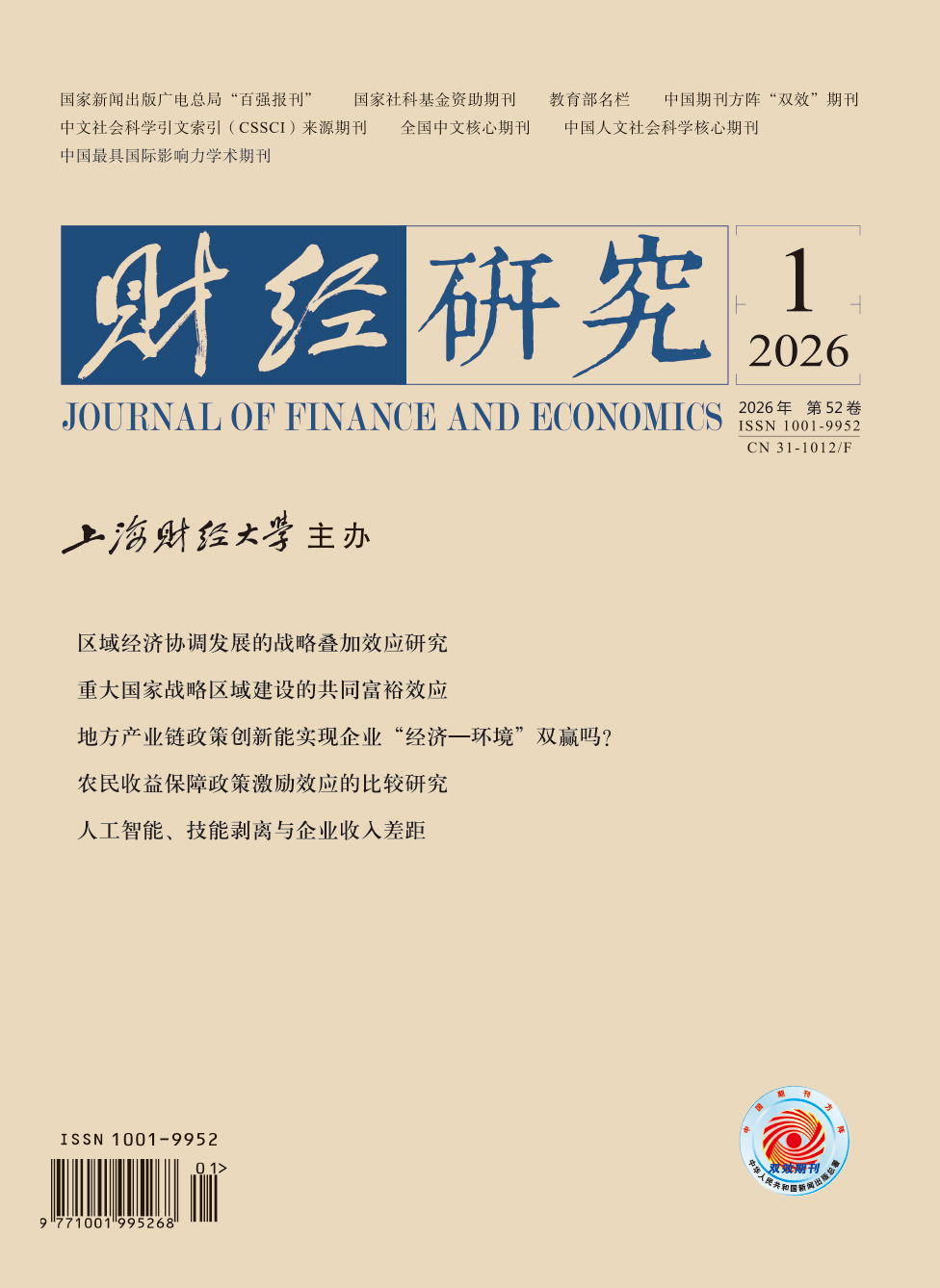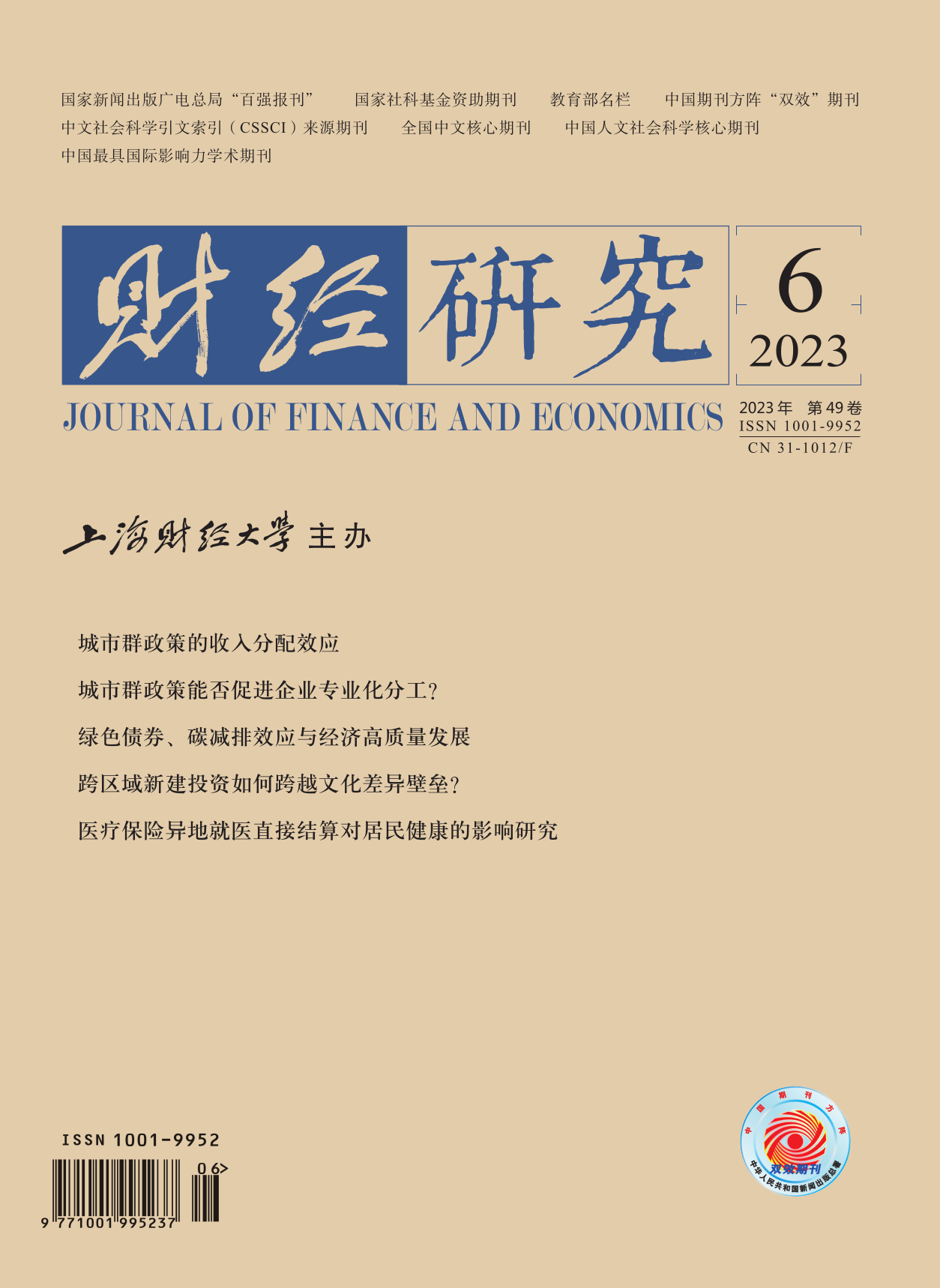谁来“保市场主体”?如何畅通内循环资本流动以及促进跨区域市场主体建设?文化差异等非经济因素在其中起着怎样的作用?为了回答这些问题,文章以我国上市公司2008—2019年跨区域设立市场主体的新建投资为研究样本,引入同时包含自然与社会属性的姓氏距离作为文化差异的代理变量,研究资本流出地与流入地间的文化差异对内循环资本流动中跨区域市场主体建设的影响。研究发现,相对于企业所在地区间的文化差异,企业家的文化背景差异对跨区域市场主体建设有着更为显著的影响,是阻碍内循环资本流动的一个重要因素。进一步研究还发现,双边信任不足是文化差异阻碍跨区域市场主体建设的重要机制,而良好的营商环境则能够抵消其不利影响。因此,只有拉近其与企业家之间的距离,增强双边信任,同时更加重视营商环境建设,才更有可能跨越地区文化差异的壁垒,加强跨区域市场主体的建设,打造内循环资本流动的国内大市场。
跨区域新建投资如何跨越文化差异壁垒?——基于企业和企业家比较的视角
摘要
参考文献
1 蔡宁. 文化差异会影响并购绩效吗−基于方言视角的研究[J]. 会计研究,2019,(7):43−50. DOI:10.3969/j.issn.1003-2886.2019.07.006
2 曹春方,刘秀梅,贾凡胜. 向家乡投资:信息、熟悉还是代理问题?[J]. 管理世界,2018,(5):107−119. DOI:10.3969/j.issn.1002-5502.2018.05.009
3 曹春方,夏常源,钱先航. 地区间信任与集团异地发展−基于企业边界理论的实证检验[J]. 管理世界,2019,(1):179−191. DOI:10.3969/j.issn.1002-5502.2019.01.012
9 段玉婉,洪槟瀚,陈斌开. 全球价值链视角下的“距离之谜”探究[J]. 世界经济,2021,(10):3−29. DOI:10.19985/j.cnki.cassjwe.2021.10.002
10 高翔,龙小宁. 省级行政区划造成的文化分割会影响区域经济吗?[J]. 经济学(季刊),2016,(2):647−674. DOI:10.13821/j.cnki.ceq.2016.01.10
14 李诗,吴超鹏. 中国企业跨国并购成败影响因素实证研究−基于政治和文化视角[J]. 南开管理评论,2016,(3):18−30. DOI:10.3969/j.issn.1008-3448.2016.03.003
15 李晓红. 并购与新建投资的选择策略分析[J]. 商业研究,2006,(19):108−111. DOI:10.3969/j.issn.1001-148X.2006.19.032
18 田园,王铮. 非正式制度因素对创业的影响作用探讨[J]. 中国软科学,2016,(3):24−34. DOI:10.3969/j.issn.1002-9753.2016.03.003
19 王风华,范徵. 文化差异成本与跨文化交易费用的衡量[J]. 生产力研究,2006,(10):239−240. DOI:10.19374/j.cnki.14-1145/f.2006.10.093
20 王皓. 文化差异对我国企业对外直接投资区位选择的影响[D]. 上海: 上海外国语大学, 2014.
21 王淑娟,孙华鹏,崔淼,等. 一种跨国并购渗透式文化整合路径−双案例研究[J]. 南开管理评论,2015,(4):47−59. DOI:10.3969/j.issn.1008-3448.2015.04.006
22 王小鲁, 樊纲, 胡李鹏. 中国分省份市场化指数报告(2018)[M]. 北京: 社会科学文献出版社, 2019.
24 熊名宁,汪涛,赵鹏,等. 文化距离如何影响跨国战略联盟的形成−基于交易成本视角的解释[J]. 南开管理评论,2020,(5):145−158. DOI:10.3969/j.issn.1008-3448.2020.05.014
25 徐现祥,刘毓芸,肖泽凯. 方言与经济增长[J]. 经济学报,2015,(2):1−32. DOI:10.16513/j.cnki.cje.2015.02.001
27 于文超,梁平汉. 不确定性、营商环境与民营企业经营活力[J]. 中国工业经济,2019,(11):136−154. DOI:10.19581/j.cnki.ciejournal.2019.11.008
29 张航,范子英,杨现领. 方言、文化认同与住房市场交易[J]. 经济学(季刊),2021,(2):693−712. DOI:10.13821/j.cnki.ceq.2021.02.15
31 Ashraf Q, Galor O. The ‘out of Africa’ hypothesis, human genetic diversity, and comparative economic development[J]. American Economic Review,2013,103(1): 1−46. DOI:10.1257/aer.103.1.1
32 Beugelsdijk S, Kostova T, Kunst V E, et al. Cultural distance and firm internationalization: A meta-analytical review and theoretical implications[J]. Journal of Management,2018,44(1): 89−130. DOI:10.1177/0149206317729027
33 Bloom N, Sadun R, Van Reenen J. The organization of firms across countries[J]. The Quarterly Journal of Economics,2012,127(4): 1663−1705. DOI:10.1093/qje/qje029
34 Boateng A, Du M, Bi X G, et al. Cultural distance and value creation of cross-border M&A: The moderating role of acquirer characteristics[J]. International Review of Financial Analysis,2019,63: 285−295. DOI:10.1016/j.irfa.2018.12.009
35 Brouthers L E, Marshall V B, Keig D L. Solving the single-country sample problem in cultural distance studies[J]. Journal of International Business Studies,2016,47(4): 471−479. DOI:10.1057/jibs.2016.15
36 Carlin B I, Dorobantu F, Viswanathan S. Public trust, the law, and financial investment[J]. Journal of Financial Economics,2009,92(3): 321−341. DOI:10.1016/j.jfineco.2008.07.001
37 Child J, Möllering G. Contextual confidence and active trust development in the Chinese business environment[J]. Organization Science,2003,14(1): 69−80. DOI:10.1287/orsc.14.1.69.12813
38 Das T K, Teng B S. Between trust and control: Developing confidence in partner cooperation in alliances[J]. The Academy of Management Review,1998,23(3): 491−512. DOI:10.2307/259291
39 Doney P M, Cannon J P, Mullen M R. Understanding the influence of national culture on the development of trust[J]. The Academy of Management Review,1998,23(3): 601−620. DOI:10.2307/259297
41 Fisman R, Miguel E. Corruption, norms, and legal enforcement: Evidence from diplomatic parking tickets[J]. Journal of Political Economy,2007,115(6): 1020−1048. DOI:10.1086/527495
42 Guiso L, Sapienza P, Zingales L. Cultural biases in economic exchange?[J]. The Quarterly Journal of Economics,2009,124(3): 1095−1131. DOI:10.1162/qjec.2009.124.3.1095
43 Hofstede G. Culture’s consequences: International differences in work-related values[M]. Beverly Hills, CA: Sage Publications, 1980.
44 Li K, Griffin D, Yue H, et al. How does culture influence corporate risk-taking?[J]. Journal of Corporate Finance,2013,23: 1−22. DOI:10.1016/j.jcorpfin.2013.07.008
45 Muethel M, Bond M H. National context and individual employees’ trust of the out-group: The role of societal trust[J]. Journal of International Business Studies,2013,44(4): 312−333. DOI:10.1057/jibs.2013.9
46 Pavlou P A, Gefen D. Building effective online marketplaces with institution-based trust[J]. Information Systems Research,2004,15(1): 37−59. DOI:10.1287/isre.1040.0015
47 Qian C L, Cao Q, Takeuchi R. Top management team functional diversity and organizational innovation in China: The moderating effects of environment[J]. Strategic Management Journal,2013,34(1): 110−120. DOI:10.1002/smj.1993
49 Shane S. The effect of national culture on the choice between licensing and direct foreign investment[J]. Strategic Manage- ment Journal,1994,15(8): 627−642. DOI:10.1002/smj.4250150805
50 Shenkar O. Cultural distance revisited: Towards a more rigorous conceptualization and measurement of cultural differences[J]. Journal of International Business Studies,2012,43(1): 1−11. DOI:10.1057/jibs.2011.40
51 Tenzer H, Pudelko M, Harzing A W. The impact of language barriers on trust formation in multinational teams[J]. Journal of International Business Studies,2014,45(5): 508−535. DOI:10.1057/jibs.2013.64
52 Weber R A, Camerer C F. Cultural conflict and merger failure: An experimental approach[J]. Management Science,2003,49(4): 400−415. DOI:10.1287/mnsc.49.4.400.14430
引用本文
陈思翀, 王贤明. 跨区域新建投资如何跨越文化差异壁垒?——基于企业和企业家比较的视角[J]. 财经研究, 2023, 49(6): 79-93.
导出参考文献,格式为:
下一篇:腐败治理、税收执法与民营企业避税





 7662
7662  8013
8013

